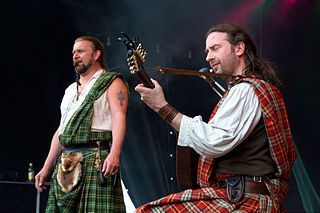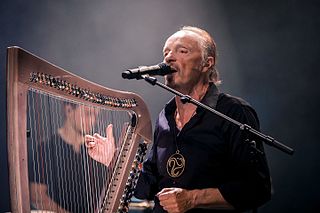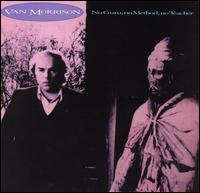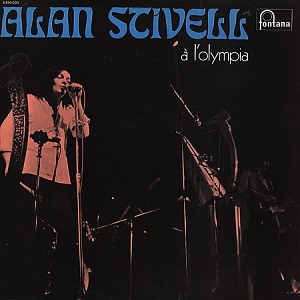
Celtic music is a broad grouping of music genres that evolved out of the folk music traditions of the Celtic people of Northwestern Europe. It refers to both orally-transmitted traditional music and recorded music and the styles vary considerably to include everything from traditional music to a wide range of hybrids.
Since the early 1970s, Brittany has experienced a tremendous revival of its folk music. Along with flourishing traditional forms such as the bombard-biniou pair and fest-noz ensembles incorporating other additional instruments, it has also branched out into numerous subgenres.

Alan Stivell is a Breton and Celtic musician and singer, songwriter, recording artist, and master of the Celtic harp. From the early 1970s, he revived global interest in the Celtic harp and Celtic music as part of world music. As a bagpiper and bombard player, he modernized traditional Breton music and singing in the Breton language. A precursor of Celtic rock, he is inspired by the union of the Celtic cultures and is a keeper of the Breton culture.

Dan Ar Braz is a Breton guitarist-singer-composer and the founder of L'Héritage des Celtes, a 50-piece Pan-Celt band. Leading guitarist in Celtic music, he recorded as a soloist and with Celtic harp player Alan Stivell. He represented France in the Eurovision Song Contest 1996.

Open Road is the eighth studio album, and ninth overall, from Scottish singer-songwriter Donovan and the debut album from the short-lived band Open Road. While his previous work was composed by his playing solo on acoustic guitar and then recorded with a shifting cast of session musicians, Open Road was Donovan's effort toward writing and recording music as a member of a band.
Celtic Symphony may refer to

Tír na nÓg are an Irish folk duo formed in Dublin, Ireland, in 1969 by Leo O'Kelly and Sonny Condell. They are often considered one of the first progressive folk bands with other artists like Nick Drake or groups like Pentangle. Their music mainly consists of their own compositions, based on strong Celtic roots and typically featuring intricate acoustic guitar playing and close harmony singing. In their early years, they toured the folk clubs of the United Kingdom or internationally as a support act for several rock bands. Today, they sporadically give concerts, especially in Ireland.

No Guru, No Method, No Teacher is the sixteenth studio album by Northern Irish singer-songwriter Van Morrison, released in 1986 on Mercury.

Jef Le Penven was a French composer, born in Pontivy, Morbihan, Brittany.

Chemins de Terre is a folk rock album by Alan Stivell, originally released in 1973. It was produced by Franck Giboni. It was retitled From Celtic Roots... in the United Kingdom and Celtic Rock in Germany.

Renaissance de la Harpe Celtique or Renaissance of the Celtic Harp is a 1972 record album by the Breton master of the Celtic harp Alan Stivell that revolutionised the connection between traditional folk music, modern rock music and world music.

Red Cardell is a French, Breton rock band, that mixes Breton music with rock, folk, blues, world music and chanson réaliste.
Loudest Whisper are an Irish folk rock/progressive folk group formed in the early 1970s and led by songwriter and guitarist Brian O'Reilly. They are best known for their 1974 debut album, The Children of Lir, a folk opera based on the Irish legend of the same name. The original LP release of the album became one of the most sought after records in Ireland, and ranks among the top 100 rarest records in the world.
Robbi Finkel is an American-Canadian composer, record producer, pianist and arranger. Grammy nominated, Finkel is an honorary lifetime voting member of the National Academy of Recording Arts and Sciences.

Pat O'May is a French musician who blends rock music with elements of world music. He originally worked with the heavy metal band Marienthal, and also produced several solo albums. He has written over 100 tracks for the TV show European coast seen from the sky. He participated in Alan Simon's rock operas Anne de Bretagne, Excalibur: The Celtic Rock Opera and started working with Martin Barre touring and recording with him.

À l'Olympia was Stivell's first live album, recording at L'Olympia. It was released by Fontana in 1972.
Pop-Plinn is a traditional air of a Breton dance transformed into pop music by Alan Stivell. The "Dañs Plinn" is a fast and physical dance where the dancer makes two small jumps by holding the arm of his neighbors.

The Festival de Cornouaille is an annual festival taking place in Quimper, a city in the south-west of Brittany, a western region of France. The festival begins on the third Sunday of July and lasts for one week. It has been held since 1923 and is one of the biggest cultural events in Brittany.

Again is the Alan Stivell's seventeenth album released in 1993 under the Keltia III label by Disques Dreyfus and Sony Music in France. He registers again his greatest successes of the seventies with updated arrangements and help of prestigious guests : Kate Bush, Shane MacGowan from the Irish group The Pogues, the Senegal singer Doudou Ndiaye Rose, the French singers Laurent Voulzy and Breton singers Gilles Servat and Yann-Fañch Kemener.

Emerald is the 23rd album by Breton musician Alan Stivell, released in 2009. The album celebrates Stivell's 40-year career since 1970's Reflets (Reflections), his first album as a singer. It's a return to the roots, a return to the violin and to folk-rock, and both an ever innovative approach, playing on electric harp and bagpipes prototypes and in musical arrangements that are as eclectic as they are original.
















